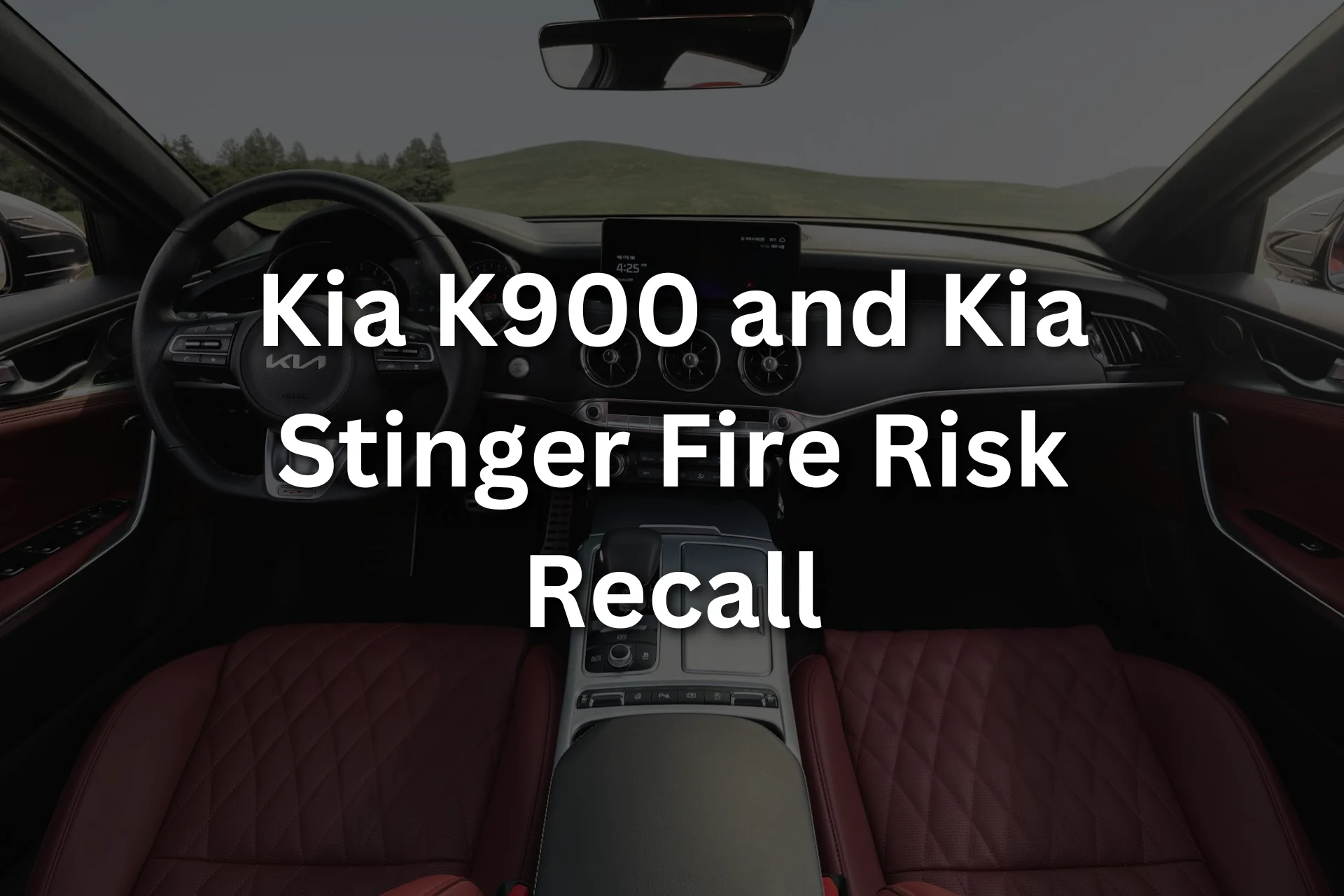Legally reviewed by: Chuck Panzarella, JD
Kia America, Inc. has recently issued a safety recall for certain 2019-2020 Kia K900 and 2018-2022 Kia Stinger vehicles equipped with 3.3-liter turbo gasoline direct injection engines. The recall addresses an issue with the left-hand turbocharger oil feed pipe and hose assembly that could lead to an engine compartment fire while driving. A total of 36,248 vehicles are affected by this recall.

What is Causing the Fire Risk?
Over time, the left-hand turbocharger oil feed pipe and hose assembly may deteriorate due to prolonged exposure to radiant heat from the exhaust manifold. This deterioration can cause oil leaks, which in the presence of hot exhaust components, significantly increases the risk of an engine compartment fire.
What Are Some Warning Signs?
Owners should be on the lookout for the following potential warning signs of this defect:
- Burning smell from the engine area
- Illumination of the engine oil pressure warning light
- Oil leak from the engine compartment
- White smoke coming from the engine compartment
If you notice any of these signs, it is crucial to have your vehicle inspected by a Kia dealer immediately to prevent further damage or a potential fire.
Which Kia Models Are Affected?
The following Kia models are included in this fire risk recall:
- 2019-2020 Kia K900 (792 units)
- 2018-2022 Kia Stinger (35,455 units)
- One (1) 2023 Kia Stinger vehicle
The recall population was determined through a review of vehicle, engine, and supplier production records by Kia. However, the affected vehicles were not produced in sequential VIN order.
Can I Keep Driving My Kia?
Kia strongly advises owners of the recalled K900 and Stinger models to park their vehicles outdoors and away from any structures or combustible materials until the repair is completed. Driving with an oil leak increases the risk of an underhood fire.
To remedy the issue, Kia dealers will replace the left-hand turbocharger oil feed pipe and hose assembly with an improved component made from a material less susceptible to deterioration. All repairs will be performed free of charge.
Kia will also reimburse owners for any repair expenses previously incurred related to this defect, as outlined in Kia’s General Reimbursement Plan filed on May 10, 2022.
When Will Owners Be Notified?
Kia plans to begin notifying dealers about the recall on April 24, 2024, with owner notification letters scheduled to be mailed out starting on April 26, 2024.
Owners can also contact Kia’s Customer Care Center at 1-800-333-4542 and reference recall number SC300 for more information.
What Should I Do If My Kia Is Having Issues?
If your Kia vehicle is experiencing potential problems related to this recall or any other issues, here are some recommended steps:
- Don’t ignore warning signs such as leaks, smells, warning lights, or unusual noises. Have the vehicle inspected promptly by a Kia dealer.
- Review your owner’s manual and document any symptoms you notice to help the technician diagnose the problem.
- Stay up-to-date on scheduled maintenance to avoid many common issues and catch problems early.
- Sign up for recall alerts at NHTSA.gov to be notified if your Kia is affected by any future safety recalls.
- Contact Kia customer service at 1-800-333-4542 if you have general questions or concerns about your vehicle.
- Keep records of all repairs and communications with the dealer, which can be helpful for recurring problems or potential warranty claims.
- If repairs are taking an unreasonable amount of time, request a loaner vehicle from the dealer to maintain transportation while your car is being serviced.
Staying proactive about potential issues and working closely with an authorized Kia dealer can help resolve problems before they escalate.
How Can a Lemon Law Attorney Help?
If you have been dealing with repeated defects or non-conformities with your Kia that the manufacturer has been unable to repair after a reasonable number of attempts, you may have a viable lemon law claim. Some defects, such as this turbocharger oil feed pipe issue, can potentially create serious safety risks.
Under state lemon laws, you could be entitled to a repurchase, replacement vehicle, or compensation from the manufacturer if your car meets the criteria as a lemon. An experienced lemon law attorney from Consumer Action Law Group can review your case details and advise you on the best course of action to pursue relief.
Don’t continue to put up with a problematic vehicle that the manufacturer cannot properly repair. Call our firm at (818) 254-8413 for a free case evaluation, or fill out our online contact form to have one of our lemon law specialists reach out to you.












